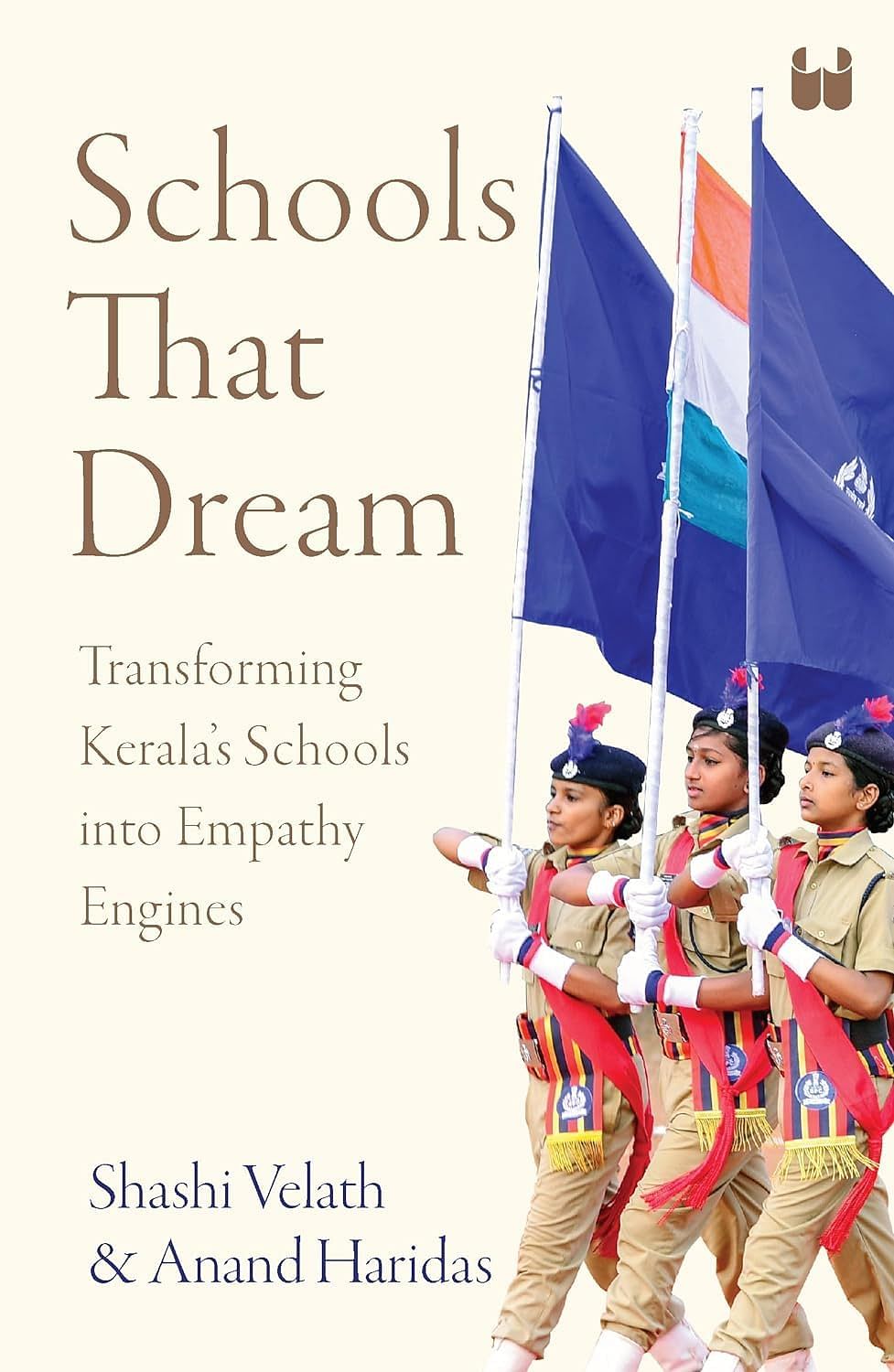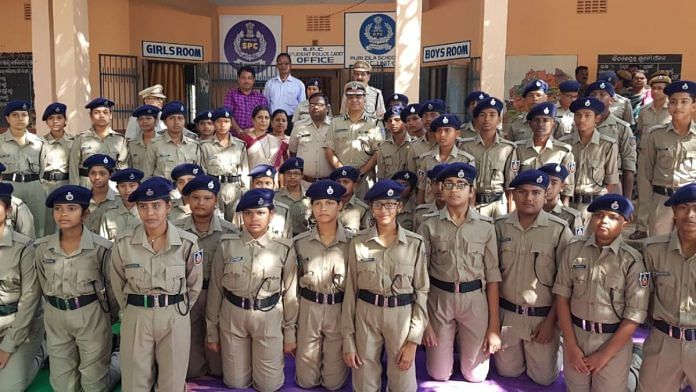Before the dust settled down in front of town hall in Kochi that evening in 2006, Vijayan had learnt many lessons from his teachers—children who fearlessly engaged and shared their views with police officials. After reading the harsh comments about the police force, he planned for the children to accompany uniformed personnel to police stations—some handled traffic on the road for a while, others went along with officers for beat patrolling. At the end of these immersive visits, the children appreciated the goodness of those who donned the police uniform.
For the next two years, Vijayan developed the idea of a constructive interface between children and the law. He talked to many, discussed the idea with like-minded people and by 2008, had drafted a proposal. He shared it with Kodiyeri Balakrishnan, the then Minister for Home, Kerala. The minister immediately instructed him to submit a formal proposal and make a presentation to officials at the ministry.
The SPC programme was the result of this curious quest to reimagine schools as innovation hubs to unleash generations of informed young citizens. This is a two-year programme for high school students to inculcate citizenship responsibilities. It deeply ingrains in them the values espoused by the Constitution of India, helps them understand how lawabiding citizens contribute to societal harmony and progress for all and enhances the leadership potential in the children. Apart from inculcating respect for the law, the programme focuses on enhancing inner capabilities, self-discipline, civic sense, empathy for the vulnerable sections of society and resistance to social evils.
The transformative objective of the programme is to initiate a generational shift by creating an army of changemakers capable and willing to convert India’s demographic bulge into a demographic dividend. The SPC programme has ingrained the four Cs of the twenty-first century: critical thinking, creativity, communication and collaboration. It is implemented as a collaborative programme between the departments of the state government and departments of home, education, health, forest, excise, SC/ST and social welfare and civil society at large.
As instructed by the state government, a pilot project was implemented in 2008 at Government Vocational Higher Secondary School, Iringole; St Peter’s School, Kolenchery in Ernakulam district; and Government Higher Secondary School, Alappuzha. Two years later, at the Kerala School Youth Festival, the largest confluence of school students in Asia, SPC captured the imagination of government authorities and civil society. The cadets were roped in to augment the organisation of this mega-annual event in Kozhikode. The confidence with which the cadets pulled off their responsibilities won the hearts and minds of the public and the media.
After the impressive show at Kozhikode, the Government of Kerala launched the SPC project across the state in 2010. The programme was launched in 120 schools with 44 students in each batch. Even then, people were not sure what this force of children in uniform was all about. Some confused it with the NCC, others with the NSS.
Three years later, in 2013, Prime Minister Narendra Modi, who was the then Chief Minister of Gujarat, sent a delegation led by Hasmukh Patel IPS, a top Gujarat police official, to Kerala to study the programme. He spent many days with cadets, parents, teachers, SPC officials, top police officials and bureaucrats and interacted with the home minister and chief minister. He then presented a detailed report to the Government of Gujarat, which led to the launch of the SPC programme on a large scale.
Haryana and Rajasthan followed suit. Official delegations from these states travelled through Kerala to study the SPC programme in detail. Soon, these states also had student cadets proudly marching along. In 2014, K.J. George, the then Minister of Home in Karnataka, visited Kerala. Vijayan shared a detailed presentation with him and soon, Karnataka joined the list of states adopting SPC.
The next big turn in SPC history took place when the then Union Minister for Home, Rajnath Singh, visited Kerala in January 2017. He was bowled over by the show of professional discipline, enthusiasm and patriotic spirit of more than 6,000 cadets.
The very next day, he announced the possibilities of a national roll-out of the programme on social media. Ten days after his first visit, the minister returned to Kerala with a retinue of officials from the Ministry of Home Affairs. This time, he had fifteen queries ready with him. In the presence of the home secretary, state police chief and other top police officials, Vijayan made an elaborate presentation, answering all doubts the minister had raised.
Impressed with the achievements of SPC, Singh instructed the Bureau of Police Research and Development to prepare a detailed report for the national rollout. A mega event was convened in Gurugram in Haryana, where thousands of children, including thirty student police cadets, representatives from all states running the programme, participated. Singh, in the presence of Union Human Resources Development Minister Prakash Javedkar, Haryana Chief Minister Manohar Lal Khattar and other dignitaries, rolled out SPC on a national level in July 2018. This meant that financial assistance from the union government was released for the implementation of the SPC programme.
UNICEF stepped into partnership with the SPC programme and declared student police cadets as Child Rights Ambassadors. Delegates from Tanzania, Ghana and Kazakhstan visited and there were enquiries about the programme from Sri Lanka, Maldives and many other countries. Indeed, student police cadets have started their march across the globe.
Vijayan’s SPC initiative is embedded in some key strategic insights, which he discusses below:
While designing the SPC programme, I was determined to incorporate all the feedback I received from school students whenever I interacted with them. We know that school students will become responsible citizens of tomorrow—be they politicians, bureaucrats, entrepreneurs, jurists, police personnel and so on if rightly trained and mentored. But what if this does not happen? This is critical in our times because global demographic trends show that 25.65 per cent of the global population is below the age of 14 years and 42 per cent below the age of 25 years. Among all developing nations, India is home to the world’s largest youth population, with one-third of its population aged less than 14 years, half of the population aged around 25 years and 65 per cent below 35 years.
 The excerpt is taken from Schools That Dream: Transforming Kerala’s Schools into Empathy Engines by Shashi Velath and Anand Haridas and has been published with permission from Westland Books.
The excerpt is taken from Schools That Dream: Transforming Kerala’s Schools into Empathy Engines by Shashi Velath and Anand Haridas and has been published with permission from Westland Books.



